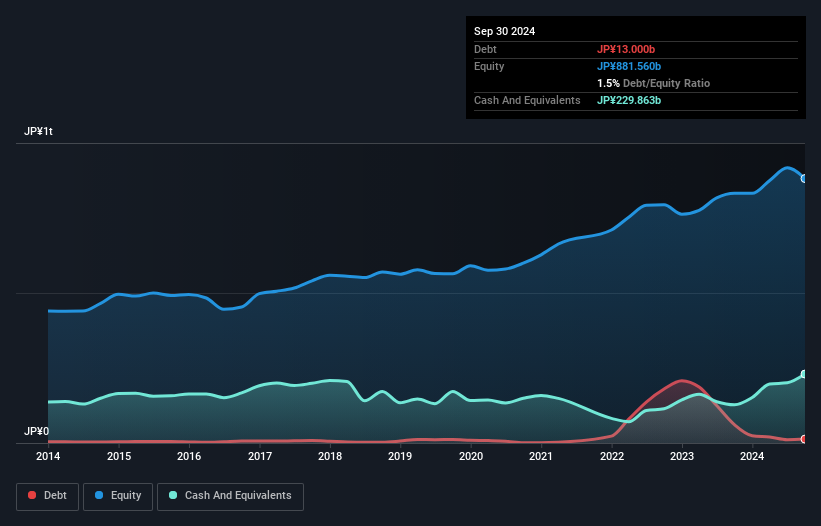David Iben put it well when he said, 'Volatility is not a risk we care about. What we care about is avoiding the permanent loss of capital.' So it seems the smart money knows that debt - which is usually involved in bankruptcies - is a very important factor, when you assess how risky a company is. As with many other companies Makita Corporation (TSE:6586) makes use of debt. But the real question is whether this debt is making the company risky.
Why Does Debt Bring Risk?
Debt is a tool to help businesses grow, but if a business is incapable of paying off its lenders, then it exists at their mercy. In the worst case scenario, a company can go bankrupt if it cannot pay its creditors. However, a more frequent (but still costly) occurrence is where a company must issue shares at bargain-basement prices, permanently diluting shareholders, just to shore up its balance sheet. Of course, plenty of companies use debt to fund growth, without any negative consequences. When we think about a company's use of debt, we first look at cash and debt together.
View our latest analysis for Makita
How Much Debt Does Makita Carry?
The image below, which you can click on for greater detail, shows that Makita had debt of JP¥13.0b at the end of September 2024, a reduction from JP¥60.9b over a year. However, it does have JP¥229.9b in cash offsetting this, leading to net cash of JP¥216.9b.

How Healthy Is Makita's Balance Sheet?
We can see from the most recent balance sheet that Makita had liabilities of JP¥133.9b falling due within a year, and liabilities of JP¥31.5b due beyond that. Offsetting this, it had JP¥229.9b in cash and JP¥105.6b in receivables that were due within 12 months. So it can boast JP¥170.1b more liquid assets than total liabilities.
This surplus suggests that Makita has a conservative balance sheet, and could probably eliminate its debt without much difficulty. Succinctly put, Makita boasts net cash, so it's fair to say it does not have a heavy debt load!
Better yet, Makita grew its EBIT by 125% last year, which is an impressive improvement. That boost will make it even easier to pay down debt going forward. There's no doubt that we learn most about debt from the balance sheet. But it is future earnings, more than anything, that will determine Makita's ability to maintain a healthy balance sheet going forward. So if you want to see what the professionals think, you might find this free report on analyst profit forecasts to be interesting.
Finally, while the tax-man may adore accounting profits, lenders only accept cold hard cash. Makita may have net cash on the balance sheet, but it is still interesting to look at how well the business converts its earnings before interest and tax (EBIT) to free cash flow, because that will influence both its need for, and its capacity to manage debt. During the last three years, Makita generated free cash flow amounting to a very robust 97% of its EBIT, more than we'd expect. That positions it well to pay down debt if desirable to do so.
Summing Up
While we empathize with investors who find debt concerning, you should keep in mind that Makita has net cash of JP¥216.9b, as well as more liquid assets than liabilities. And it impressed us with free cash flow of JP¥175b, being 97% of its EBIT. So we don't think Makita's use of debt is risky. Over time, share prices tend to follow earnings per share, so if you're interested in Makita, you may well want to click here to check an interactive graph of its earnings per share history.
When all is said and done, sometimes its easier to focus on companies that don't even need debt. Readers can access a list of growth stocks with zero net debt 100% free, right now.
New: Manage All Your Stock Portfolios in One Place
We've created the ultimate portfolio companion for stock investors, and it's free.
• Connect an unlimited number of Portfolios and see your total in one currency
• Be alerted to new Warning Signs or Risks via email or mobile
• Track the Fair Value of your stocks
Have feedback on this article? Concerned about the content? Get in touch with us directly. Alternatively, email editorial-team (at) simplywallst.com.
This article by Simply Wall St is general in nature. We provide commentary based on historical data and analyst forecasts only using an unbiased methodology and our articles are not intended to be financial advice. It does not constitute a recommendation to buy or sell any stock, and does not take account of your objectives, or your financial situation. We aim to bring you long-term focused analysis driven by fundamental data. Note that our analysis may not factor in the latest price-sensitive company announcements or qualitative material. Simply Wall St has no position in any stocks mentioned.
About TSE:6586
Makita
Engages in the manufacture and sale of electric power tools, pneumatic tools, and gardening and household equipment in Japan, Europe, North America, Asia, Central and South America, Oceania, The Middle East, and Africa.
Solid track record with excellent balance sheet and pays a dividend.
Similar Companies
Market Insights
Community Narratives




